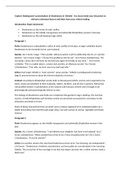Summary
Summary OTHELLO ESSAY PLANS A Level English Literature (Characters) (Edexcel)
- Course
- Institution
4 ESSAY PLANS IN THIS BUNDLE Essay plans summarising the key aspects of the main characters that appear in Othello (Othello, Iago, Emilia, Desdemona). These essay plans feature topic sentences, quotes, critical statements and context.These essay plans are very detailed and can be used in isol...
[Show more]




